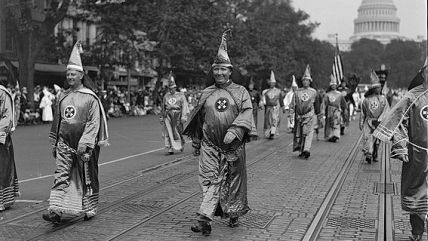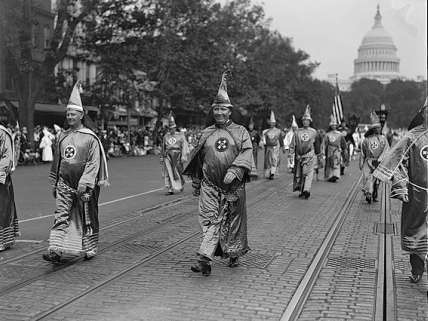Ku Klux Klan Can Go Forward with Free Speech Lawsuit, Says Georgia Supreme Court
The group's application to participate in an "Adopt-A-Highway" program was initially denied.


The Georgia Supreme Court dismissed an appeal from the Georgia Department of Transportation on Tuesday that would have prevented a local Ku Klux Klan chapter from suing the state after the group was denied the right to participate in the state's highway cleanup program.
The court rejected the department's appeal of a lower court decision in favor of the group. The appeal was filed incorrectly, it said, leaving the justices "without jurisdiction" to prevent the suit from going forward.
In May 2012, the International Keystone Knights of the Ku Klux Klan applied to participate in Georgia's "Adopt-A-Highway" program, according to CNN. The organization was seeking to pick up trash along a section of State Route 515. The transportation department denied the request for two reasons. The first was that the route is a controlled-access highway with a speed limit of 65 miles per hour; for the safety of both volunteers and drivers, the department said, this location could not be adopted.
The second reason is where things get interesting. In a June 2012 letter to member April Chambers, then–Transportation Commissioner Keith Golden said:
The impact of erecting a sign naming an organization which has a long rooted history of civil disturbance would cause a significant public concern. Impacts include safety of the travelling public, potential social unrest, driver distraction or interference with the flow of traffic. These potential impacts are such that were the application granted, the goal of the program, to allow civic minded organizations to participate in public service for the State of Georgia, would not be met.
The KKK, with help from the American Civil Liberties Union (ACLU), sued the department. While the group understood the stretch it originally proposed to adopt was not available for safety reasons, it argued the denial of the application was also a violation of its free speech. As Debbie Seagraves, the then–executive director of the ACLU of Georgia, put it:
The fundamental right to free speech is not limited to only those we agree with or groups that are inoffensive. The government cannot pick or choose who is protected by the Constitution. There will always be speech and groups conveying hateful messages that are distasteful to some. That is why the First Amendment protects free speech for all.
In November 2014, a trial judge ruled in favor of the KKK, saying the group's application was "singled-out for scrutiny not given to other applicants" and that the second reason for denial was a violation of the group's freedom of speech. The state then opted to appeal this decision.
The suit will go forward, but this win by the Ku Klux Klan may be more symbolic than anything else: The state suspended the entire highway cleanup program in 2012. Still, it's a good day for the idea that all speech, no matter how disgusting it may be, should be protected.
This is not the first time a government body and the white supremacist group have clashed with regard to trash cleanup rights. In March 2001, the United States Supreme Court refused to review an appeal by the state of Missouri, which was looking to prevent a KKK chapter from participating in their Adopt-A-Highway program. While the group won the right to pick up trash along part of Interstate 55, it was ultimately kicked out of the program for failing to actually do so.
Editor's Note: As of February 29, 2024, commenting privileges on reason.com posts are limited to Reason Plus subscribers. Past commenters are grandfathered in for a temporary period. Subscribe here to preserve your ability to comment. Your Reason Plus subscription also gives you an ad-free version of reason.com, along with full access to the digital edition and archives of Reason magazine. We request that comments be civil and on-topic. We do not moderate or assume any responsibility for comments, which are owned by the readers who post them. Comments do not represent the views of reason.com or Reason Foundation. We reserve the right to delete any comment and ban commenters for any reason at any time. Comments may only be edited within 5 minutes of posting. Report abuses.
Please to post comments


"While the group won the right to pick up trash along part of Interstate 55, it was ultimately kicked out of the program for failing to actually do so."
White trash won't pick up highway trash.
They picked up all the white trash, it was the colored trash they wouldn't touch.
Folks, he will be here all week. Veal, try it., etc.
*slow clap*
Tip the veal and try the waitress.
If only they could have bought a couple of slaves to do it for them...
I'm glad to see that the ACLU is at least willing to represent unpopular *groups,* even if it won't protect unpopular *rights* (2nd amendment, freedom of religion, etc.).
I'm surprised the ACLU didn't learn its lesson after representing the Nazis.
"If we take away these Nazis' right to burn down our headquarters, we take away everyone's right to burn down our headquarters."
What does it say about me that i'm more offended that "picking up trash" is a "right" people have to win in court....
...than i am about the existence of a racist-cosplay-rotary-club?
I presume Mark Ames has a good explanation.
That you're worse than HItler? /sarc
The Klan is back!
What about velvet?
Too hot for those late August lynchings.
And obviously, silk is just for the undergarments. Especially those men's corsets.
Silk is for pimps and Chinamen.
Not white leather?
You ever try to get mud people blood out of leather, boy?
That sounded way too authentic
SF is the grandest of the Grand Wizards.
No sequins? No rhinestones?
""While today's Klan has still been involved in atrocities, there is no way it is as violent as the Klan of the '60s," said Mark Potok of the Southern Poverty Law Center, an advocacy group that tracks activity by groups it considers extremist. "That does not mean it is some benign group that does not engage in political violence," he added."
Who are you and what did you do to the SPLC's usual spokesperson?
He's going to have to spice that up a little for the fundraising letters.
White ISIS
"The worst upsurge in Klan activities since the 1960s!"
Is the SPLC going to offer some examples of these "atrocities" and acts of "political violence"?
The Jewish Center shooter was a former leader of the KKK, although as far as I'm aware he acted alone. There were also 3 KKK members who were prison guards and plotted to kill an inmate upon release (it seems there was a personal motivation, though that doesn't preclude an additional racial/political motive).
The KKK for much of its history has been a full-blown terrorist organization, so it's not crazy to think that its members might be more likely than the average person to do these type of things.
Jewish center shooter?
Prison guards?
When was this?
I'm surprised you don't remember the Jewish center shooting, it was pretty big news.
http://tinyurl.com/ht2yotd
Here's a story about the prison guards.
http://tinyurl.com/o6fbpx5
The SPLC specifically says the current incarnation of the Klan is distinct from its former incarnations and then goes on to say it has committed atrocities and acts of political violence. I'm sure that a white supremacist organization is filled with malcontents, but that doesn't mean the SPLC can defame them.
Did they defame them? Off the top of my head I recalled two incidents of KKK members either killing people or planning to kill someone. I'm sure there are other incidents I'm not aware of. Especially if you broaden the scope beyond murder.
If that is the standard for "atrocities" and "political violence", then the SPLC homepage should be indistinguishable from MEMRI's.
Hmm, MEMRI seems to have a hard on for Russia right now. Let me amend my comment to say something more along the lines of, if the SPLC wishes to apply those standards fairly, then they have an Islam-shaped hole in their coverage of hate groups and acts.
political violence
What's this referring to? Stuff like going to a politician's rally and assaulting people who have the nerve to attend?
Ah, I see how his remark packed a bit more fundraising punch than I thought.
The splc is more focused on real hate groups, like libertarians.
"Political violence" sounds a lot like "internet violence", which is basically just saying something other people don't like.
....cotton? satin? Jesus, its like they WANT us to set ourselves on fire. WOOL, man!! Wool is the only one even mildly fire-retardant. How are we supposed to burn crosses dressed like freaking q-tips soaked in gasoline? Is there some religious objection to Nomex?
I'm sure someone's getting an FRC compliant version together now.
I just had the best/worst idea for what to wear to burning man.
Cotton is actually preferred for flame retardent properties. It's really polyester and lycra that you want to avoid.
You want to avoid lycra for reasons having nothing to do with fire resistance.
Maybe not the KKK. Maybe they want to go to yoga later. Or just like to rock the athleisure lifestyle.
you're right - at least compared to synthetics.
anybody who's spent a lot of time around campfires (or just let cigarettes burn their jeans) will tell you wool is still way-way-better when it comes to 'not bursting into flames'-properties
Jim: Oh, boys! Lookee what I got heyuh.
Bart: Hey, where are the white women at?
Railway Workers: Bart! Bart! We thought you was hung."
Black Bart: "I am."
How many times have I told you to wash your hands after cross burnin's?
"you're white and Christian"
Used ta be they'd only let in Anglo-Saxon Protestants. Now they've loosened the standards to white Christians. Seems like the Klan is too desperate for members to uphold their old standards. Next thing you know it'll be Indo-European Judeo-Christians, then soon after that they'll just let anyone in.
soon after that they'll just let anyone in.
Obligatory
The impact of erecting a sign naming an organization which has a long rooted history of civil disturbance would cause a significant public concern.
So the SPLC and NCAA are out then, I imagine?
The NCAA? What's the NAACP, chopped liver?
Cripes. Let them do the highway work. And rename the particular stretch they're assigned to "The Malcom X Memorial Highway".
Like.
"Ya know, that Malcolm X was right about there bein' differences between the races, too bad he had it backwards about which was the superior race...and too bad he ended up turning into some kinda multicultural Muslim..."
"Martin Luther King Memorial Highway"
1. Get a picture of them dutifully picking up litter.
2. Post.
3. Laugh.
Give them a stretch of road in a dangerous hood.
"But we're the *original* boys in the hood!"
There is actually a KKK t-shirt that says this. It's part of some meme.
Damn kids with their skateboards and memes.
I actually heard about their joke, but only after I'd thought of something similar.
If I see some Klansman working beside the highway, I'd rather he was wearing orange instead of white.
somewhat relevant
What's two inches long and has a couple little holes near the top?
A Ku Klux Kondom.
I have compromise: let them pick up trash from the side of a road, but require them to wear their hoods and robes while doing so so that passing motorists can chuck trash at them. They get their freedom of speech, the state gets its roadz cleaned up, and everyone else gets to mock klansmen. Win-win-win.